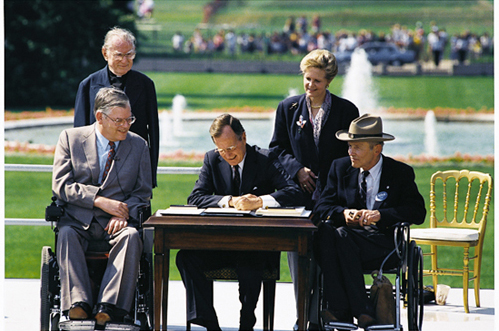Accessibility
What the ADA Has Meant to Me
July 26, 2018 | Written by: Erich Manser
Categorized: Accessibility
Share this post:
Man, I’m old. I can’t believe it’s been 28 years since the Americans with Disabilities Act became law in the US. Sure, twenty-eight years is a blip on a screen in the grand scheme of humankind, but when I think of all that’s changed, personally and for disability rights, it seems like eons.

President George H.W. Bush signs the Americans with Disabilities Act during a ceremony on the South Lawn of the White House on July 26, 1990. (Source: Public Domain – Wikipedia Commons)
On July 26th, 1990, President George H.W. Bush signed in to law the Americans with Disabilities Act (ADA), which is the US legislation that made “reasonable accommodations” a requirement for companies to give employees with disabilities, if needed to be able to do the job.
At that time, I was a junior in high school, still driving a car, and with only vague ideas about what I might want to do for a career. I certainly didn’t see myself as “disabled”, even though we had learned when I was 5 that I had a condition which leads to blindness. At that moment in time, however, I really just had this “nuisance” night-blindness, and certainly no concerns with disability or ‘reasonable accommodations’ in the workplace.
Vision loss caught up with me, though, and by the late 90’s, I started to notice changes in how I could interact with “these new-fangled computers”; default settings that everyone else seemed to be using were a strain for me, uncomfortable, even painful to use.

Erich Manser, IBM Accessibility, IBM Research.
During college, in a busy city setting, I had (with great reluctance) taken to using a white cane around campus at night, for safety and to alert others to the fact that I didn’t see well. I had had this experience of calling upon assistive tech, when needed, and now found myself faced with a new “job or no job” situation. This seemed like an appropriate time to begin searching some new assistive options again.
Thankfully, throughout my career, I have had the benefit of extremely supportive managers, eager to provide whatever help I’ve needed to be able to do the job. As someone losing sight gradually, the decision to disclose or not disclose my disability was not terribly difficult for me, as I’ve just sort of shared openly with my managers as things were happening, in some ways we were “on the ride together”.
Over time, I’ve come to recognize the importance of the ADA for helping employees with disabilities access the supports they need in the workplace, and have thankfully never experienced a denial of such supports myself. I’ve appreciated the collaborative spirit of each of my managers, and have worked to avoid any sense of entitlement in the workplace, though knowing the ADA is in force feels empowering in your back pocket.
Now at the late stages of vision loss, I am extremely grateful for the ADA, anxious to see it continue, and with a growing sense of responsibility for personal activism. I feel compelled to help tackle the fact that, despite the ADA, unemployment among working aged adults with disabilities remains unacceptably high, in the US and worldwide. It’s on us to be the change we wish to see, and I’m all in for helping continue to push forward.
Happy 28th Anniversary to the ADA!

IBM Accessibility, IBM Research
Making the workplace safe for employees living with HIV
The recent promising news about Covid-19 vaccines is in sharp contrast to the absence of a vaccine for HIV, despite decades of research. Unlike Covid-19 with a single viral isolate that shows minimal diversity, HIV circulates in a wide range of strains that so far have proven impervious to a single vaccine. Fortunately, more people […]
Call for Code for Racial Justice Needs You: Join the Movement
IBM has never avoided taking on big challenges. At IBM, we are privileged to drive impact at scale. We take on challenges that transform our clients, impact people’s lives and innovate for future generations as we strive to effect systematic societal change. Over the course of our 109-year history, the evidence has become clear that […]
A New Wave: Transforming Our Understanding of Ocean Health
Humans have been plying the seas throughout history. But it wasn’t until the late 19th century that we began to truly study the ocean itself. An expedition in 1872 to 1876, by the Challenger, a converted Royal Navy gunship, traveled nearly 70,000 nautical miles and catalogued over 4,000 previously unknown species, building the foundations for modern […]


